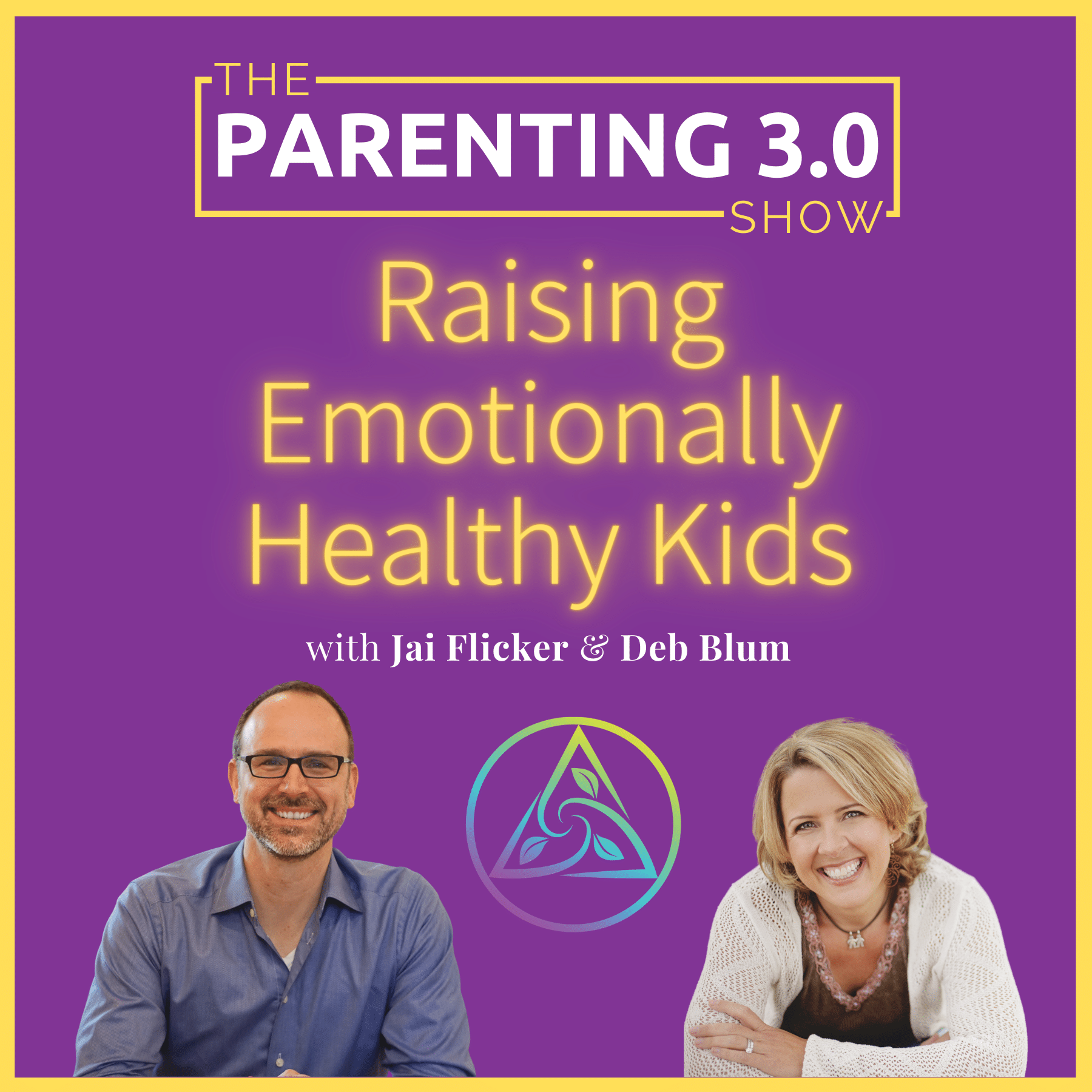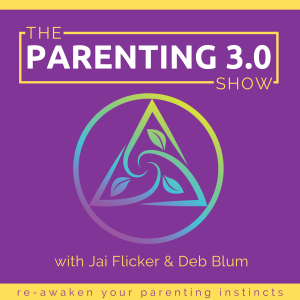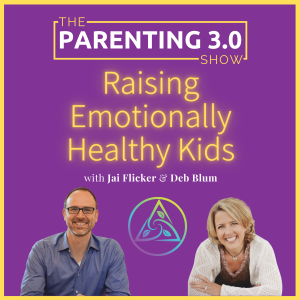

Join Jai Flicker, Educator and Founder of LifeWorks Learning Center and Deb Blum, Parent and Life Coach, as we help re-awaken your natural parenting instincts. Each week we’ll bring together wisdom from the past and scientific and psychological research from the present to support you in your parenting journey. Parenting 3.0 isn’t a fad or a quick fix. It’s a set of principles that allows us to respond to our kids and life from an informed and empowered place AND raise emotionally healthy kids. Listen in!
Join Jai Flicker, Educator and Founder of LifeWorks Learning Center and Deb Blum, Parent and Life Coach, as we help re-awaken your natural parenting instincts. Each week we’ll bring together wisdom from the past and scientific and psychological research from the present to support you in your parenting journey. Parenting 3.0 isn’t a fad or a quick fix. It’s a set of principles that allows us to respond to our kids and life from an informed and empowered place AND raise emotionally healthy kids. Listen in!
Episodes

Thursday Jan 16, 2020
Helping Relationships - Part 3: The Ten Characteristics (6-10)
Thursday Jan 16, 2020
Thursday Jan 16, 2020
This week, Jai and Deb continue to explore the work of Carl Rogers, diving even deeper into the topic of helping relationships, which Rogers defines as relationships that "other people can use for their own personal growth."
In this episode we discuss the second five out of ten characteristics that Rogers identifies as essential to supporting personal growth in others. These five characteristics are:
6) Understanding
7) Acceptance
8) Safety
9) Non-evaluation
10) Confirmation
Join us as we discover together how to form powerful helping relationships!
Links we mentioned (or should have) in this episode:
STAY CONNECTED WITH DEB & JAI:
Like the Parenting 3.0 Podcast Facebook Page: https://www.facebook.com/parenting3podcast/
And find them on their websites: https://LifeWorks.life and https://DebBlum.com
The Parenting 3.0 Show is a weekly long-form discussion aimed at helping to make parenting more effective and enjoyable for parents and more beneficial for kids.

Thursday Jan 09, 2020
Helping Relationships - Part 2: The Ten Characteristics (1-5)
Thursday Jan 09, 2020
Thursday Jan 09, 2020
This week, Jai and Deb continue to explore the work of Carl Rogers, diving even deeper into the topic of helping relationships, which Rogers defines as relationships that "other people can use for their own personal growth."
In this episode we discuss the first five out of ten characteristics that Rogers identifies as essential to supporting personal growth in another person. The first five characteristics are:
1) Dependability
2) Congruence
3) Positive Regard
4) Healthy Separateness for Oneself
5) Healthy Separateness for the Other
Join us as we discover together how to form powerful helping relationships!
Links we mentioned (or should have) in this episode:
STAY CONNECTED WITH DEB & JAI:
Like the Parenting 3.0 Podcast Facebook Page: https://www.facebook.com/parenting3podcast/
And find them on their websites: https://LifeWorks.life and https://DebBlum.com
The Parenting 3.0 Show is a weekly long-form discussion aimed at helping to make parenting more effective and enjoyable for parents and more beneficial for kids.

Wednesday Jan 01, 2020
Helping Relationships - Part 1: Supporting Self-Actualization
Wednesday Jan 01, 2020
Wednesday Jan 01, 2020
This week, Jai and Deb discuss how to support the process of Self-Actualization in our kids. Using the groundbreaking work of psychologist Carl Rogers as a framework, we explore topics such as authenticity, unconditional love and the power of understanding.
We also explore how to form what Rogers calls helping relationships, which he defines as those relationships that "another person can use for his or her own personal growth." Rogers' three key insights into helping relationships are as follows:
1) The more that we can be genuine in a relationship, the more helpful it will be.
2) The more acceptance and liking we feel toward the other person, the more we will be creating a relationship that the other person can use for their own personal growth.
3) The more that we strive to understand the other person, the more we hold a sensitive empathy toward that person's feelings and communications, the more helpful and significant it will be.
When these three conditions are present, individuals naturally move in the direction of wholeness, maturity and self-actualization.
Links we mentioned (or should have) in this episode:
- On Becoming a Person, Carl Rogers (Book)
- Authenticity vs. Attachment, Dr. Gabor Mate (YouTube Video)
STAY CONNECTED WITH DEB & JAI:
Like the Parenting 3.0 Podcast Facebook Page: https://www.facebook.com/parenting3podcast/
And find them on their websites: https://LifeWorks.life and https://DebBlum.com
The Parenting 3.0 Show is a weekly long-form discussion aimed at helping to make parenting more effective and enjoyable for parents and more beneficial for kids.

Wednesday Dec 25, 2019
Listener Question: How to Handle Separation Anxiety
Wednesday Dec 25, 2019
Wednesday Dec 25, 2019
This week, Deb and Jai try something new where they respond to a question from a listener. The topic is separation anxiety and they use attachment theory as the basis for their answer. This was recorded using Zoom video conferencing and will be posted on YouTube too!
We'd love to know what you think about this format, and if you have a question for us - please reach out. You can email us at deb@inspire4life.com or jai@lifeworks.life.

Wednesday Dec 18, 2019
Self-Determination Theory - Part 4: Beyond Rewards and Punishments
Wednesday Dec 18, 2019
Wednesday Dec 18, 2019
This week, Jai and Deb finish mapping out the Motivation Continuum that we started discussing in Part 3 of this series, focusing on the four types of extrinsic motivation. Downloading the PDF of this continuum may be helpful. Join us as we explore the hidden costs of using rewards and punishments and what it looks like to move beyond that to more integrated forms of extrinsic motivation.
Links we mentioned (or should have) in this episode:
NY Times Article: Which is Better, Rewards or Punishments? Neither
STAY CONNECTED WITH DEB & JAI:
Like the Parenting 3.0 Podcast Facebook Page: https://www.facebook.com/parenting3podcast/
And find them on their websites: https://LifeWorks.life and https://DebBlum.com
The Parenting 3.0 Show is a weekly long-form discussion aimed at helping to make parenting more effective and enjoyable for parents and more beneficial for kids.

Wednesday Dec 11, 2019
Self-Determination Theory - Part 3: Understanding Laziness
Wednesday Dec 11, 2019
Wednesday Dec 11, 2019
This week, Jai and Deb look at laziness through the lens of Self-determination Theory, revealing that it is often actually a form of amotivation - an inability to motivate - not a willful choice to remain inactive. Amotivation falls on the far end of the powerful Motivation Continuum offered by SDT, which we begin to explain.
Links we mentioned (or should have) in this episode:
Edward Deci - On Self-Determination Theory
Jessica Lahey - Teaching the Gift of Failure
Article - Laziness Does Not Exist
STAY CONNECTED WITH DEB & JAI:
Like the Parenting 3.0 Podcast Facebook Page: https://www.facebook.com/parenting3podcast/
And find them on their websites: https://LifeWorks.life and https://DebBlum.com
The Parenting 3.0 Show is a weekly long-form discussion aimed at helping to make parenting more effective and enjoyable for parents and more beneficial for kids.

Wednesday Dec 04, 2019
Self-Determination Theory - Part 2: How To Get Ourselves and Our Kids to Do Things
Wednesday Dec 04, 2019
Wednesday Dec 04, 2019
In this episode, Jai and Deb explore motivation, starting with the search for a "silver bullet" strategy for motivating oneself to go to the gym. During this episode, we also explore the relationship between autonomy and self-actualization, and how both concepts are intimately related to motivation in general.

Wednesday Nov 27, 2019
Self-Determination Theory - Part 1: The Three Human Needs
Wednesday Nov 27, 2019
Wednesday Nov 27, 2019
This week, Jai and Deb explore three fundamental human psychological needs that, when met, lead to greater vitality, motivation and well-being and, when unmet, contribute to anxiety, depression and lowered of self-esteem. These needs, as articulated by Self-Determination Theory, are: relatedness, autonomy and competence. Join us as we discuss how to increase our own well-being and the well-being of our children.
Links we mentioned (or should have) in this episode:
STAY CONNECTED WITH DEB & JAI:
Like the Parenting 3.0 Podcast Facebook Page: https://www.facebook.com/parenting3podcast/
And find them on their websites: https://LifeWorks.life and https://DebBlum.com
The Parenting 3.0 Show is a weekly long-form discussion aimed at helping to make parenting more effective and enjoyable for parents and more beneficial for kids.

Wednesday Nov 20, 2019
Understanding "Bad" Behavior
Wednesday Nov 20, 2019
Wednesday Nov 20, 2019
Jai and Deb talk about how to better understand so-called "bad" behavior so we can more skillfully deal with the triggers that inevitably accompany the challenge of parenting.
Among the many topics that they explore, Jai and Deb show how inquiring into the stories we tell ourselves about the ways our children behave can help us be both more effective and more peaceful.
In addition, they discuss the importance of understanding and working with our own nervous systems as well as how, by reimagining our role as parents, we can bring new levels of insight and sensitivity to our relationships with our children.
Links we mentioned (or should have) in this episode:
- Byron Katie’s Inquiry Work: The Work and her Judge Your Neighbor Worksheet
STAY CONNECTED WITH DEB & JAI:
Like the Parenting 3.0 Podcast Facebook Page: https://www.facebook.com/parenting3podcast/
And find them on their websites: https://LifeWorks.life and https://DebBlum.com
The Parenting 3.0 Show is a weekly long-form discussion aimed at helping to make parenting more effective and enjoyable for parents and more beneficial for kids.

Tuesday Nov 12, 2019
Attachment Theory - Part 4: Not Dominant, Not Permissive, the Loving Alpha
Tuesday Nov 12, 2019
Tuesday Nov 12, 2019
This week, Jai and Deb conclude their exploration of Attachment Theory, focusing this time on the Loving Alpha.
What's the Loving Alpha? Well, it's not authoritarian or dominant style parenting and it's also not permissive. Think of it as something that is aligned with who we are and how we're meant to parent our children. Tune in to better understand what the alpha is and what it's not.
We also get into why adolescents seem so rebellious and how the Alpha can best relate to the more "demanding" child in order to prevent more problems in the future.
At the end we discuss that we don’t need to be perfect - yes, we want to hit the mark as much as we can, but when we miss the mark, we can regulate ourselves and repair the rupture.
Links we mentioned (or should have) in this episode:
STAY CONNECTED WITH DEB & JAI:
Like the Parenting 3.0 Podcast Facebook Page: https://www.facebook.com/parenting3podcast/
And find them on their websites: https://LifeWorks.life and https://DebBlum.com
The Parenting 3.0 Show is a weekly long-form discussion aimed at helping to make parenting more effective and enjoyable for parents and more beneficial for kids.